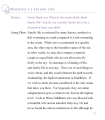family happiness : ค้นหาหนังสือธรรมะ หน้า 9 / 9
หน้าหนังสือทั้งหมด

218
Journey to Joy
Journey to Joy
218
I didn't want to come out of this comfort
zone. I wanted to continue sitting and observing.
I didn't feel tired, cold or hot, or uncomfortable,
and I felt I could sit in that positi
This text reflects on the profound experience of meditation leading to a deeper understanding of happiness and inner peace. The author shares how meditation has transformed their perspective, enabling

241
Meditation for World Peace
Peace
role models for others to follow until everyone in
the world attains genuine peace.
The attainment of happiness through
meditation is our goal. Simply focus the mind
inside the body at the centr
The text discusses the importance of meditation as a means to achieve genuine peace and happiness. By focusing the mind internally at the center of the body, individuals can improve their understandin

246
Journey to Joy
Journey to Joy
246
the proud and the humble of heart, all seek
peace... genuine peace.
The very Constitution of the United States
of America guarantees, “The right to life, liberty
and the pursuit of
This text discusses the pursuit of genuine peace and happiness as guaranteed by the U.S. Constitution. It emphasizes that true happiness stems from inner peace achieved through meditation. The author,

288
Journey to Joy
Journey to Joy
288
very quickly. Through this simple technique, one
can attain inner happiness. You may think that it
cannot possibly be this simple, but all you need
to do is to meditate and relax. I
Journey to Joy explores a straightforward approach to finding inner happiness through meditation and relaxation. The text emphasizes that complexity leads to stress, while embracing simplicity allows

303
Meditation in Everyday Life
Meditation in Everyday Life
Happiness in every way
Ꭺ
s you meditate on a daily basis, you
will notice the positive changes in your
life, whether it is sleeping in peace or waking
up in peace, sitting,
Daily meditation brings positive transformations in life, enhancing peace in sleep and wakefulness. It brightens one's appearance, rejuvenates skin, and elevates speech, making it more powerful and tr

221
The Path to Inner Stillness and Universal Love
If you have an internal experience that differs from what you normally experience, do not become agitated or happy. Keep your mind unperturbed, just observe dispassionately. Do not be pleased or displ
In this insight, the practice of meditation is highlighted where one is encouraged to maintain a dispassionate observation of internal experiences. This leads to a refined mind centered at the body’s

82
Bhojana Sutta: The Significance of Giving a Meal
8. Bhojana Sutta:
A Meal
"In giving a meal, the donor gives five things to the recipient
Which five? He/she gives life, beauty, happiness, strength, & quick - wittedness.
Having given life, he/sh
The Bhojana Sutta highlights the spiritual significance of giving a meal, describing how the donor, by providing food, imparts five essential qualities to the recipient: life, beauty, happiness, stren

84
The Virtue of Abstaining: Bhojana Sutta
The picture contains the following text:
---
The Virtue of Abstaining
8. Bhojana Sutta
The prudent person giving life, strength, beauty, quick - wittedness - the wise person, a giver of happiness
The Bhojana Sutta emphasizes the importance of virtuous living and the impact it has on one's life. By giving life, strength, beauty, and happiness to others, an individual cultivates their own happin

127
The Journey of Meditation: Finding Happiness in Practice
But if you begin your practice in the right way, even if the result may appear slow but in fact it is not slow at all. Although there’s no shortcut in the way of practice, in due time the shortcut wil
Meditation requires patience and practice, leading to joy over time. By cultivating stillness and happiness during practice, you can improve your inner experience. Like a child in kindergarten, approa

162
Glossary of Buddhist Terms
158 GLOSSARY
Mundane merit: merit gained through performance of good deeds, such as sweeping the temple, helping the poor, making charitable contributions.
Nibbana (Skt. Nirvana): the state of ultim
This glossary provides definitions and insights into crucial Buddhist terms such as Mundane Merit, which refers to merit from good deeds, and Nibbana, the ultimate state of happiness and enlightenment

126
Understanding Nibbana and Key Buddhist Concepts
Nibbana (Skt. Nirvana): the state of ultimate happiness, the happy condition of enlightenment, the highest spiritual attainment. This is not the sense-based happiness of the everyday livid; nor is it
Nibbana, or Nirvana, represents the ultimate happiness in Buddhism, transcending ordinary joy and marking the end of the rebirth cycle. It's a state of perfect enlightenment that goes beyond language,

72
Understanding Nirvana and the Path to Enlightenment
Nirvana
Nirvana (Pali, Nibbanna) is the state of ultimate happiness -- the happy condition of enlightenment -- the highest spiritual attainment. This is not the sense-based happiness of everyday life;
Nirvana, or Nibbanna, represents the ultimate state of happiness in Buddhism, transcending the sense-based joys of daily life. Attaining Nirvana marks the end of the rebirth cycle, granting liberation

52
The Power of Mind in Creating Happiness
Manopubbangama dhamma manosetha manomaya
manasa ce pasannena bhasati va karoti va
tato nam sukha30 manveti chava anapayi.
Verse 11: All mental phenomena have mind as their forerunner; they have mind
บทกลอนที่ 11 ระบุว่าปรากฏการณ์ทั้งหมดในจิตมีจิตเป็นผู้ส่งนำ และหากใครพูดหรือกระทำด้วยจิตที่บริสุทธิ์ ความสุขจะติดตามเขาราวกับเงาที่ไม่เคยจากไป ความคิดที่ดีจะนำไปสู่คำพูดและการกระทำที่ดี ซึ่งผลลัพธ์จะเ

101
รายนามเจ้าภาพในการทำบุญ
รายนามเจ้าภาพ อยู่ไ
* คุณสุพัตรา เสนีวงศ์ ณ อยุธยา และครอบครัว
* คุณสุมาลี ขัตพันธุ์
* คุณสุเมธ ผูกศรี
* คุณสุเมธ ศรีจรรยา
* คุณสุรพล-ธารารัฎฐ์ กัลยาวัทน์ จุฑาเจริญวงศ์
* คุณสุรรัตน์ เลื่อนอารม
* คุณส
รายนามเจ้าภาพที่เข้าร่วมในกิจกรรมทำบุญประกอบด้วยบุคคลหลากหลาย ทั้งจากครอบครัวและองค์กรต่าง ๆ เช่น คุณสุพัตรา เสนีวงศ์ ณ อยุธยา, คุณสุเมธ ผูกศรี, และมากมาย โดยมีการสนับสนุนจากกลุ่มต่าง ๆ อย่างเช่น ชมรม

16
Timeless Advice for Daughter-in-Laws from Visakha
benefactor of the Buddha). She was the daughter of a
millionaire named Dhananjaya. Visakha was to be
married and would soon move from her parents'
house to live with her future husband and his family.
Visakha, the daughter of millionaire Dhananjaya, received valuable ten-fold advice before her marriage on being a good daughter-in-law. This ancient wisdom emphasizes maintaining family privacy, navig

23
Monastic vs Secular Life: Insights on Family and Faith
Monastic v.s Secular Life
Monica
: Good, thank you. What do the monks think about
family life? And do you consider family life to be a
distraction from your faith?
Luang Phaw: Family life is restricte
In this discussion, the monk shares insights on how family life can be restrictive, comparing it to fish in a tank versus fish in the ocean. Marriage is seen as a binding constraint that can obstruct

6
Creating Harmony in the Family
Part Three Harmony in the Family
157
Chapter 15 Creating Harmony in the Family
159
Chapter 16 What Should Parents Do When Their Children
Do Not Get Along?
165
Chapter 32 Teaching Children to Live by t
Part Three of the book focuses on creating harmony in the family and the roles of parents in ensuring a peaceful and loving environment. Topics include what parents should do when their children do no

24
Dhamma for Laypersons: Cultivating Good Habits
A person who has the Dhamma for Laypersons
(Gharavas-dhamma) must display four regular habits:
1. Habit of Responsibility - Whatever the task at hand,
he must do it to the best of his ability, in term
บุคคลที่มีธรรมสำหรับอุบาสกอุบาสิกาต้องแสดงถึงนิสัยประจำสี่ประการ ได้แก่ นิสัยความรับผิดชอบ, การฝึกฝนและพัฒนาตนเอง, ความอดทน, และการเสียสละและการให้ นิสัยเหล่านี้ช่วยทำให้กลายเป็นผู้นำครอบครัวที่ดี การ

29
The Art of Mindful Observation
Humans also have eyes. We must train our eyes to be
like bamboo knots, because the most important aspect of
eyesight is, "Don't look at things you aren't supposed to
see. Don't look for trouble. Don't
In this insightful guide, the text emphasizes the importance of training our eyes and ears to focus on positivity and wisdom. It advocates not to dwell on others' faults or listen to gossip, which can

85
The Importance of Family Responsibilities and Communication
Being immature and the youngest, I would sometimes
go off on my own and not help out.
Why not?
In the mornings, I would shoot at birds and go fishing
with my friends. In the afternoon, I would panic w
This text discusses the dynamics within a family, particularly focusing on the behavior of the youngest child who often avoids responsibilities. The child learns the importance of helping siblings to
